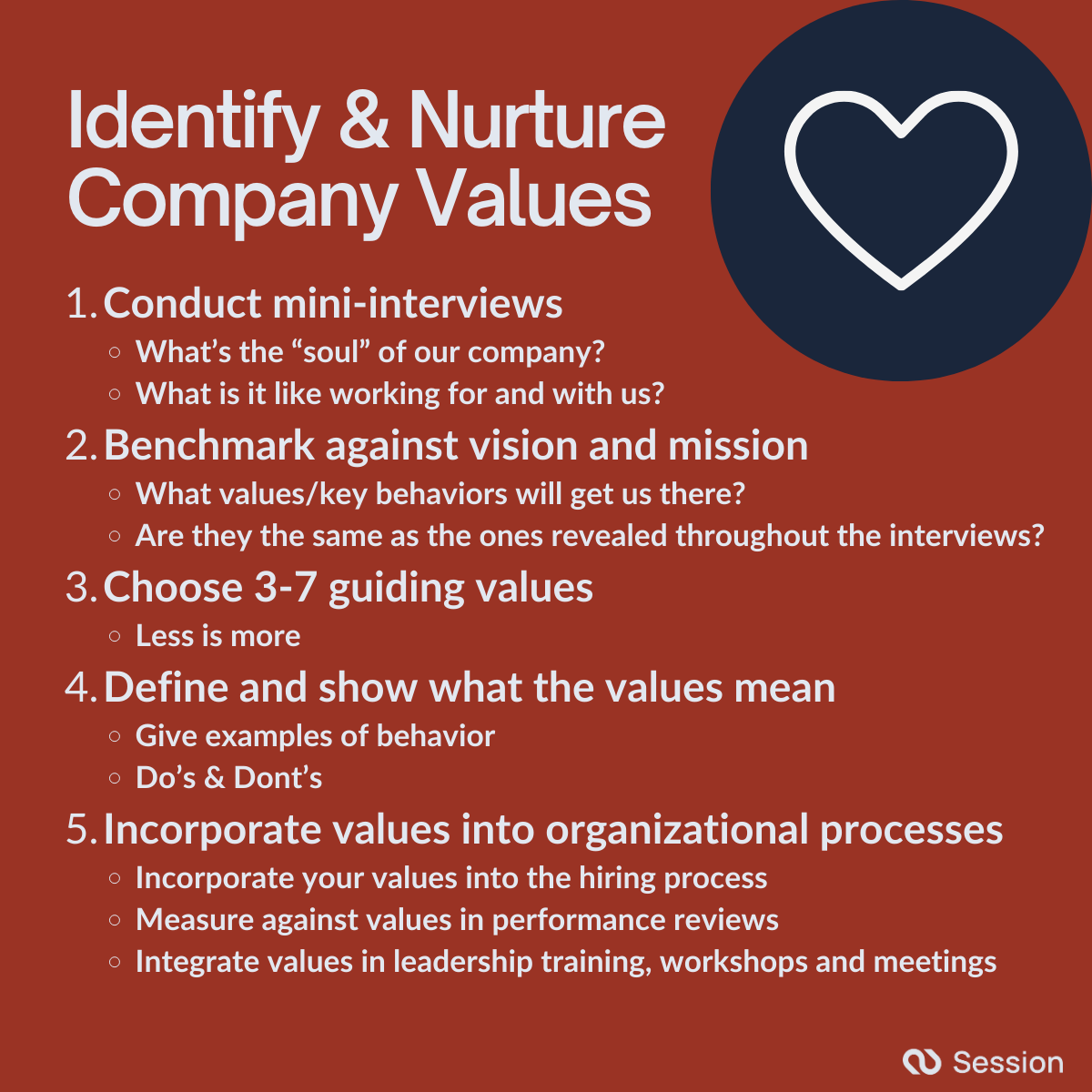Company Values are: what you value and believe will best help and guide you on your journey towards success - as a company. They are guiding principles, helping you nudge the behavior you want to see grow, internally as well as externally.
Why is it important to identify and put company values to work?
Company culture is made up of the daily actions and behavior employees do every day. It is: “How we do things around here”. Therefore, identifying and deliberately nurturing the values - and thus the daily behavior is of great importance. As long as you ensure that they are not just mere words and posters and the wall, but real lived values setting your company apart.
Values guide you when you hire (look for the right talent), develop people in the organization (what you need them to live and grow by) and in decision making (if you every time you make a decision ask yourself: Will this decision be in alignment with our core values?).
Values preserve the company culture you would like to have and which you believe will help your company grow and flourish.
Company values are the DNA of your company, the soul of your company. It impacts what you are known for - how people perceive you - and thus whether you can attract and retain the kind of talent that you would like.
In this guide we will walk you through five steps to help you identify and nurture your unique company values.
5 Step Guide to Identify and Nurture Company Values

1. Conduct mini-interviews / find the current values
Start by noticing and noting down what words best describe your company culture as it is - today. Ask around and do small mini-interviews with relevant stakeholders: Employers, founders, key customers.
Here are some of the questions you can ask them (give people time to reflect and think about their answers - but not too long - you want to grasp their initial thoughts and reactions):
- Who are we - when we are at our best? How do we act/behave, help and challenge, collaborate and work?
- What are some key examples of behavior which you believe will help our company succeed?
- In 5-7 words, what values do you believe best describe us, today? We act with…
- What key values and behaviors do you believe will help us move forward as a company - what would you like for us to nurture and help grow? We act with…
After conducting the mini-interviews, scroll through your notes. Notice what words people use to describe the current values and key behaviors as well as wishes for future behaviors and key values.
2. Benchmark current values against your vision and mission
Now, look at your vision and mission
- What are we aiming to change in the world - what is our raison d'etre - what have we set ourselves out to do in the world?
Then ask yourself:
- What values/key behaviors will get us there?
- Are they the same as the ones revealed through the interviews conducted?
3. Choose 3-7 guiding values
Now, choose and name 3-7 guiding values which you believe will help and guide you and take your company to the next level. Remember, less is more. You do not want a long list - that doesn’t help people when they need to make tough choices and decisions. What are non-negotiables for you? Things everybody needs to live and act and make choices by? Be concrete.
Now, identifying your company values is not enough. If you really want them to be guiding and to help yourself and your employees on a day to day basis when making decisions and interacting with each other and customers, you need to put them to work. Thus the next steps in this guide are equally important - you cannot skip them if you want your values to be truly “lived” in the organization!
4. Define and show what the values really mean.
The word “respect” is very broad (and very common). A way to make it more concrete is to film - in action - the behavior you would like to see more off. Make small videos showing your employees living the values in real-life, concrete situations, and share them with all employees. Have employees call out their co-workers, when they “do the right things”. Make it a habit to showcase great examples of lived values in the company.
Also, give some examples of do's and don'ts exemplifying what a value means - for you as a company.
For instance:
Respect:
- Do´s
- Be kind when you speak and interact with others
- Be mindful of others time - deliver on your promises
- Treat others as equals
- Dont´s
- Do not talk down or be aggressive towards others, no matter the situation
- Do not waste people's time
- Don´t think you are sharper, funnier, wiser, or have more right than others
5. Incorporate values into organizational processes
This last step will make sure your employees not only know of the values, but actually live by them. According to Gallup, only 23% of U.S. employees strongly agree that they can apply their organization's values in their day-to-day work! This probably has to do with the fact that many organizations might have done a good job defining the values, but fails when it comes to the incorporation part of it. So, here are a few examples of how you can incorporate the values in your day-to-day business:
- Use the values deliberately when you hire. Define some questions you can use to check off whether the person seems to possess the values or not. Ask for examples: “What would you do if…” and benchmark answers against values. Make it clear to applicants what your values are, what are non-negotiables in terms of behavior and why these are the values of importance to your company.
- Use the values when you conduct performance reviews and 1:1´s. Incorporate examples of how you are seeing the employee living the values on a day to day basis and how this is helping the company. Score the employee up against the values.
- Use the values when you run development programs, leadership training, workshops, all-hands and other kinds of meetings. Have people discuss how a certain behavior, process, procedure is best “lived” and acted upon in order to have them mirror the values. Have people role-play and see examples from one another mirroring how a certain situation is best handled in accordance with the values - also when under pressure.
Conclusion
Can companies live without having identified and nurtured their core company values? Of course. Does it matter and pays off to spend some time on identifying and nurturing your core values? Absolutely.
The values are there, no matter if you spend time on them or not. They are, as we said in the introduction, mirrored in the daily behavior of your employees.
If it matters to you what people say about you and how they perceive you - then you better take a closer look at your values. If it doesn’t matter to you - well, then no need to. But be honest: Doesn’t it always matter? Isn’t it, after all, what others say about you that makes you stand out, attract the right customers and talent? We believe it is.
Good luck identifying and nurturing YOUR company values.












